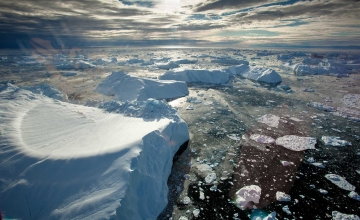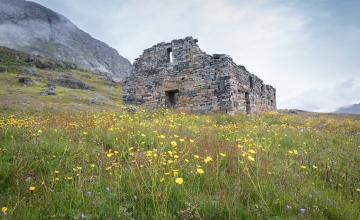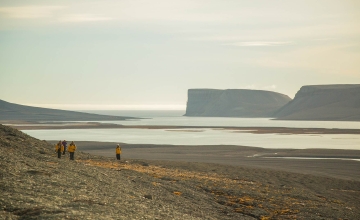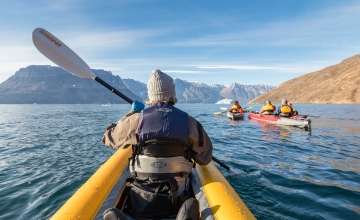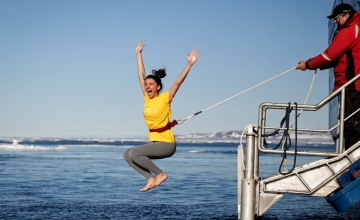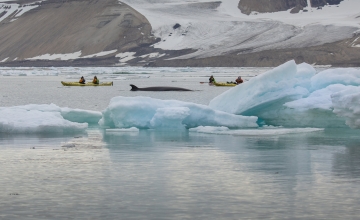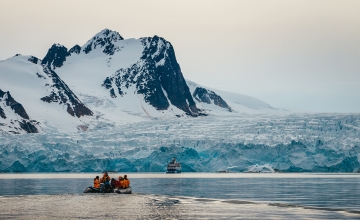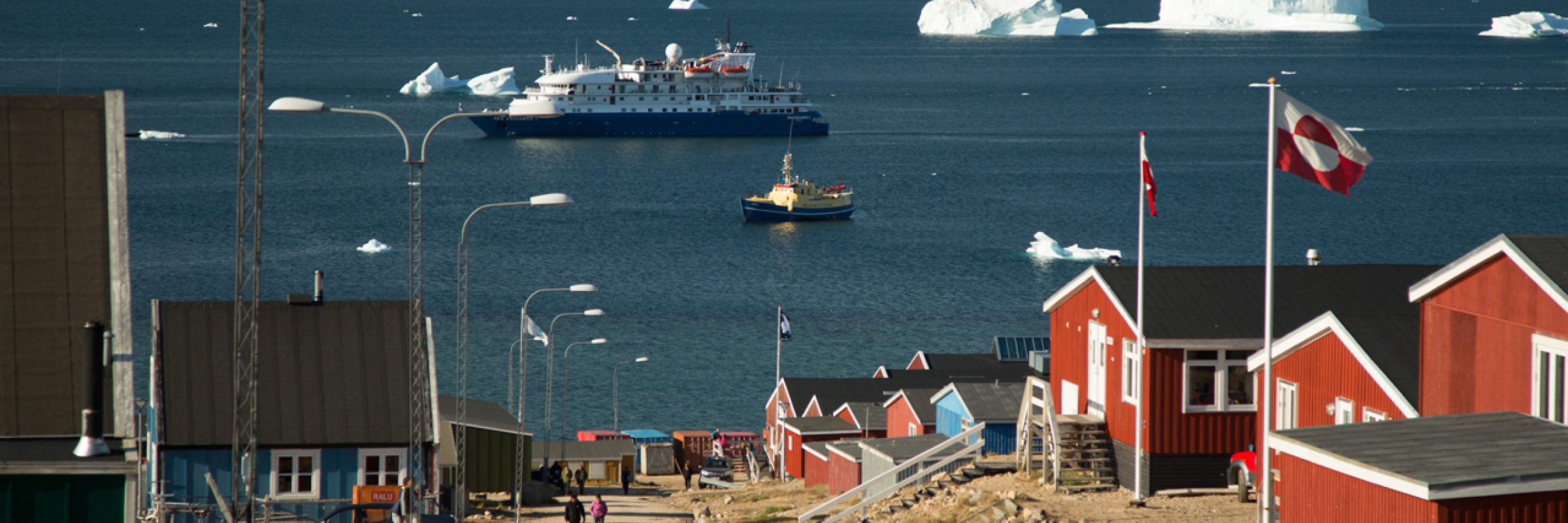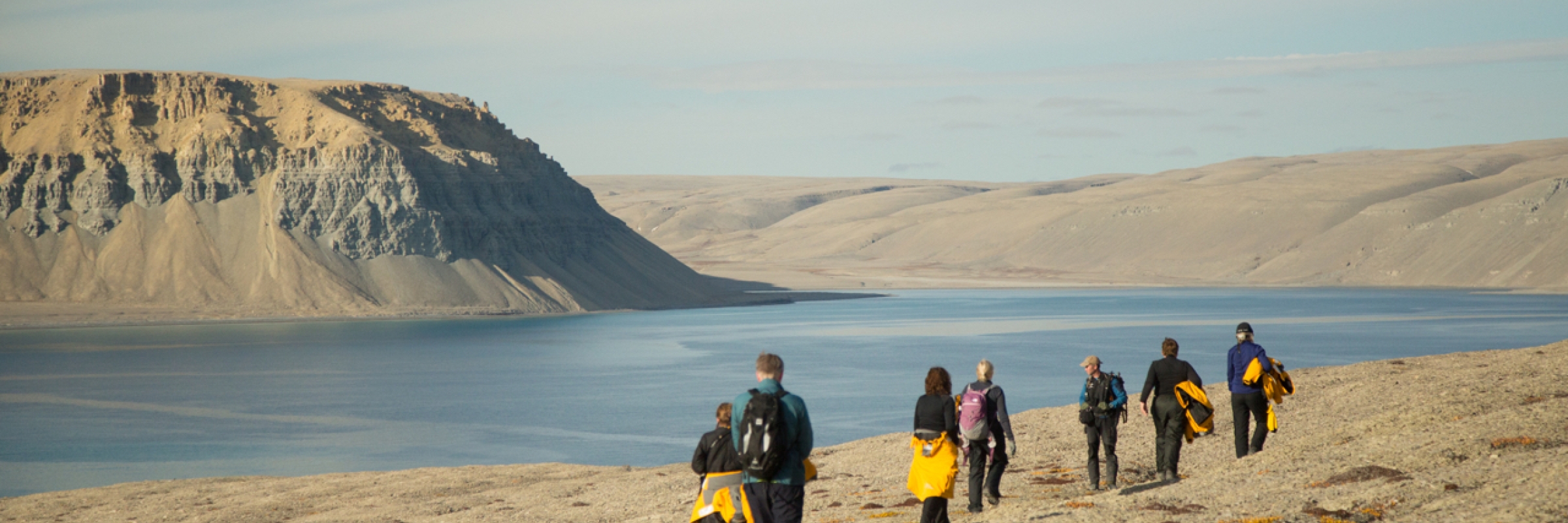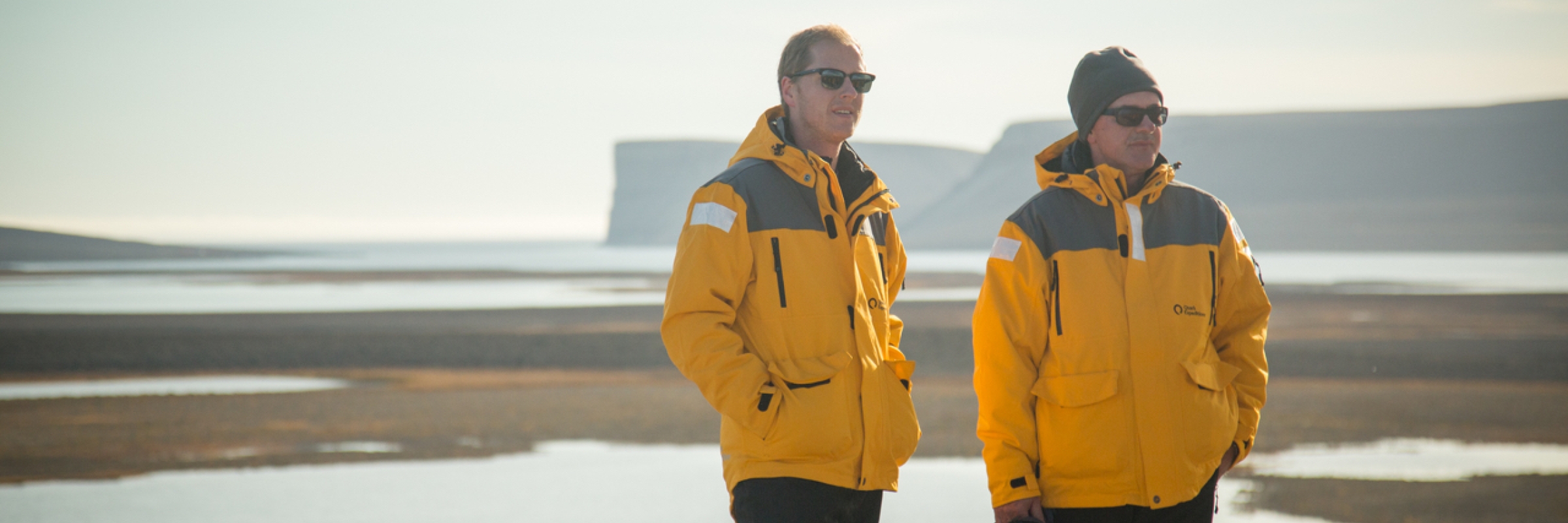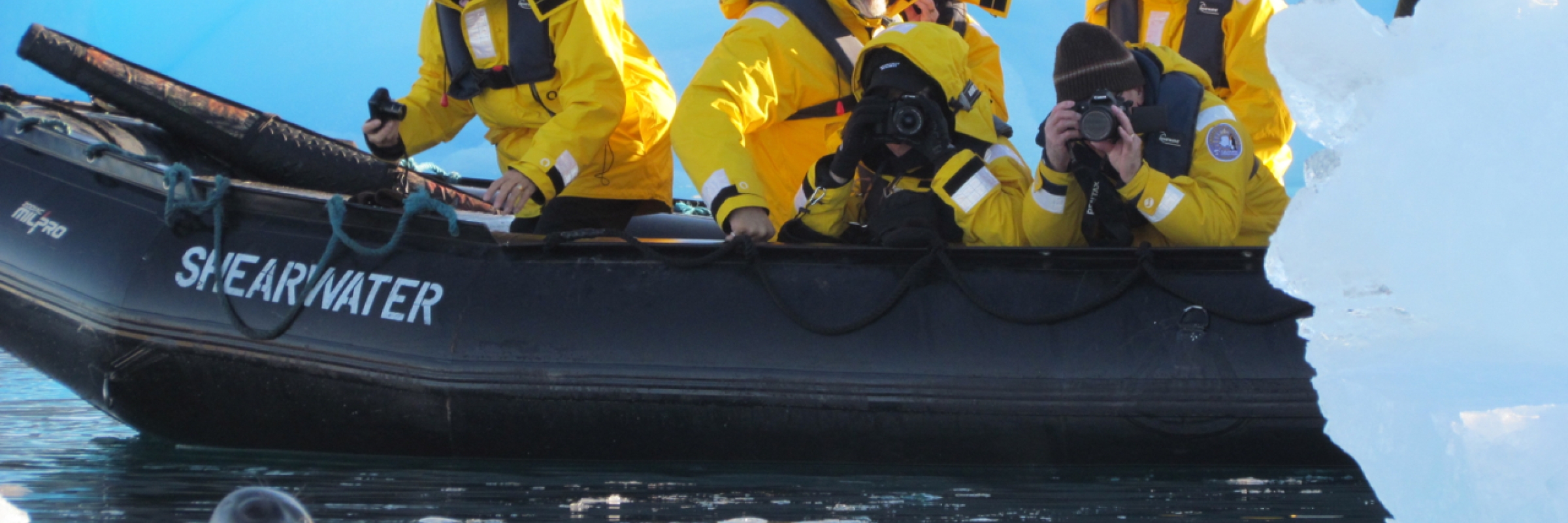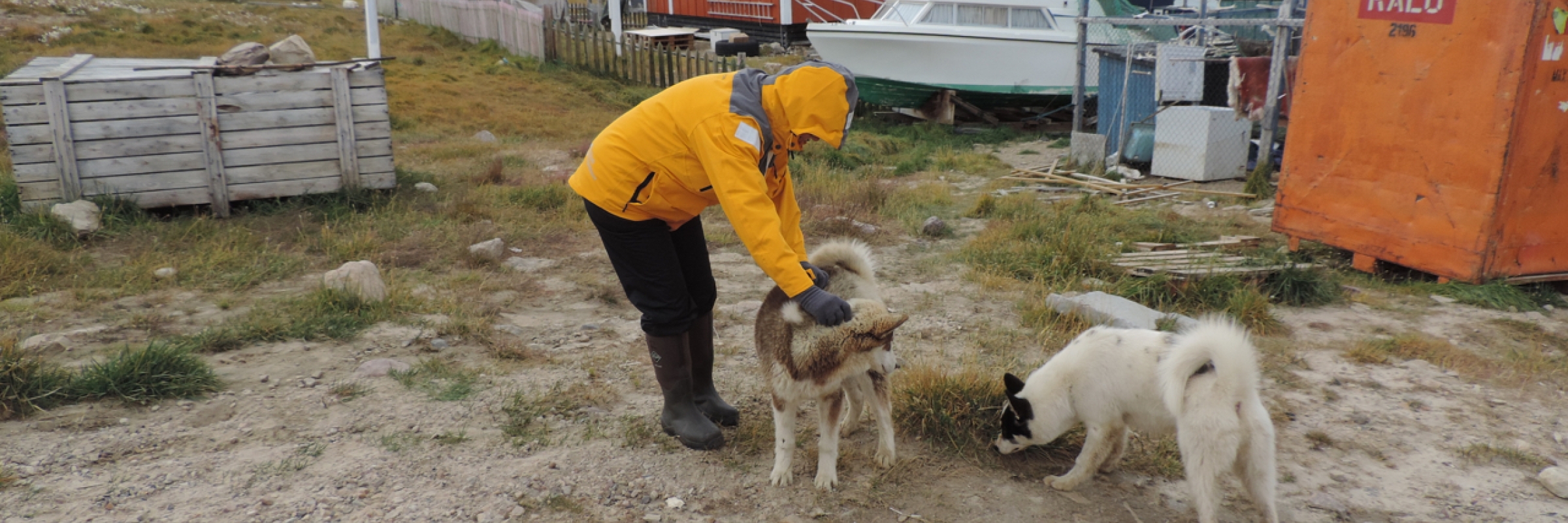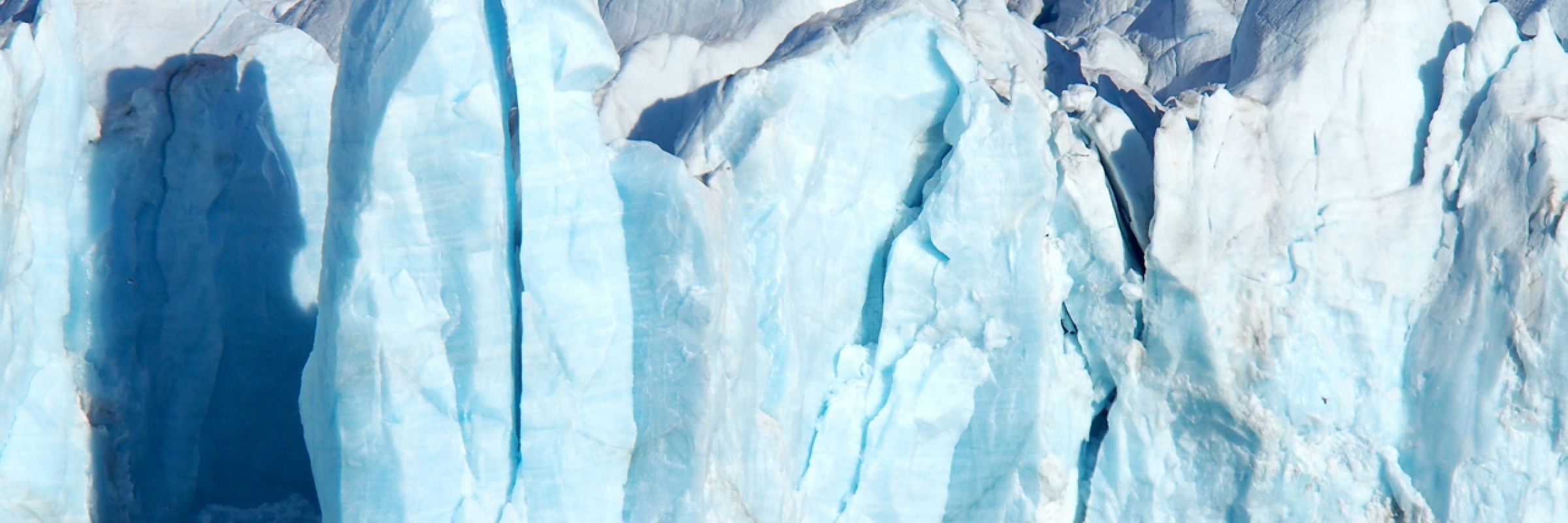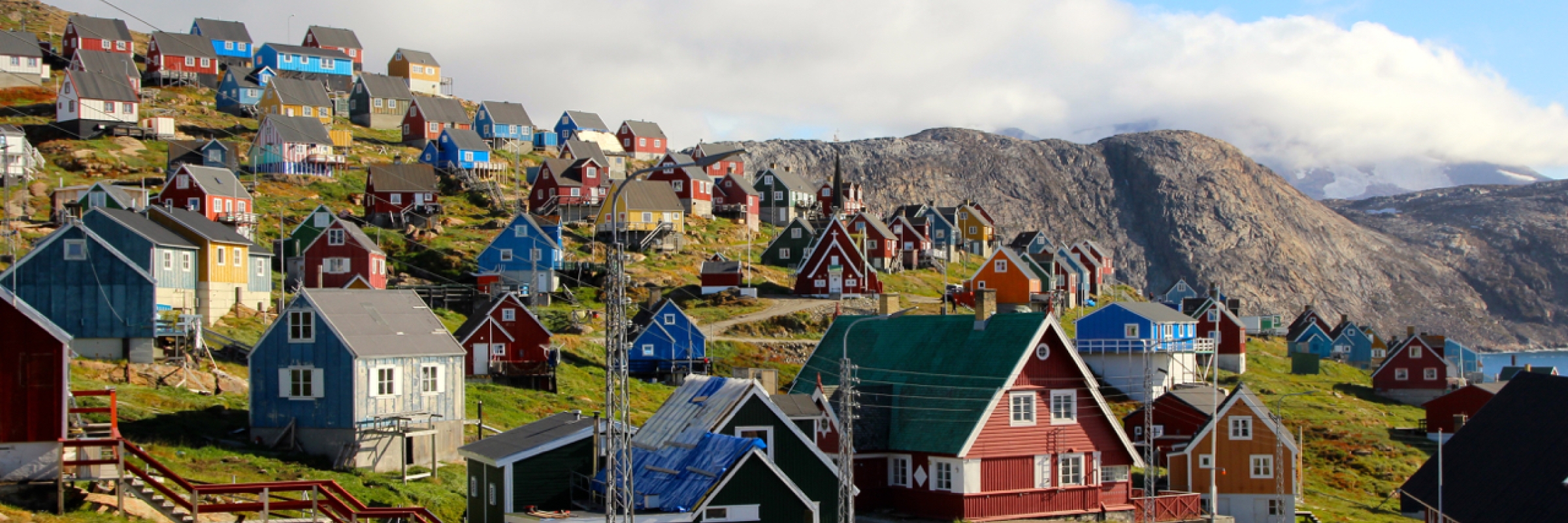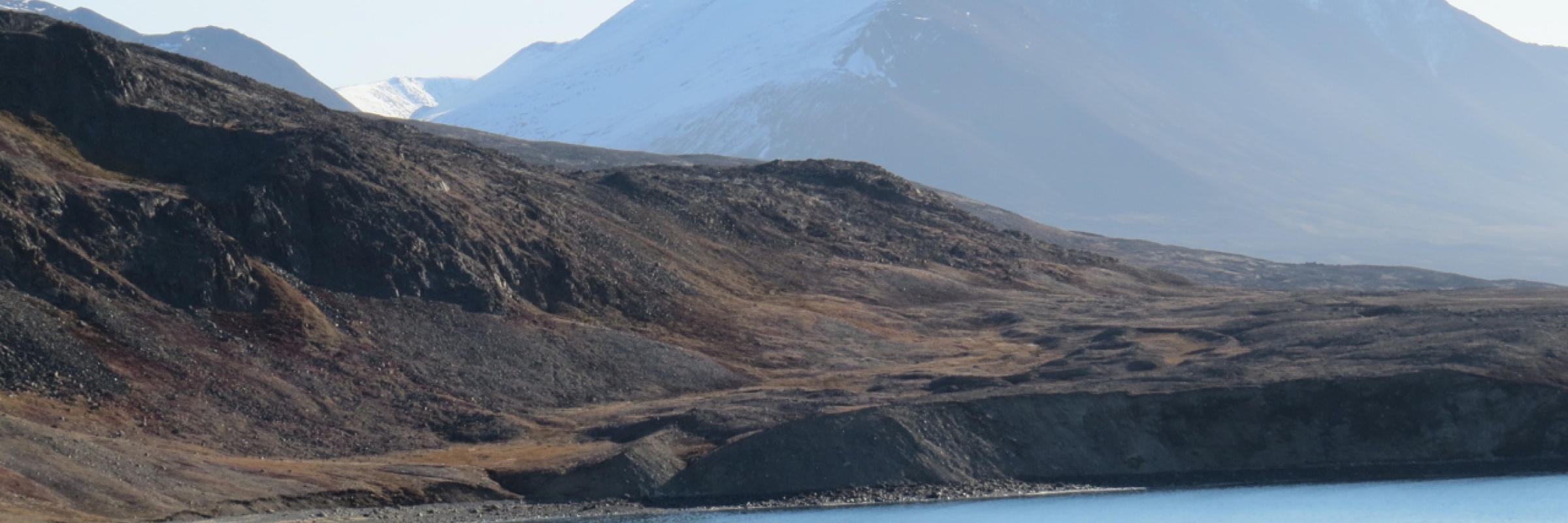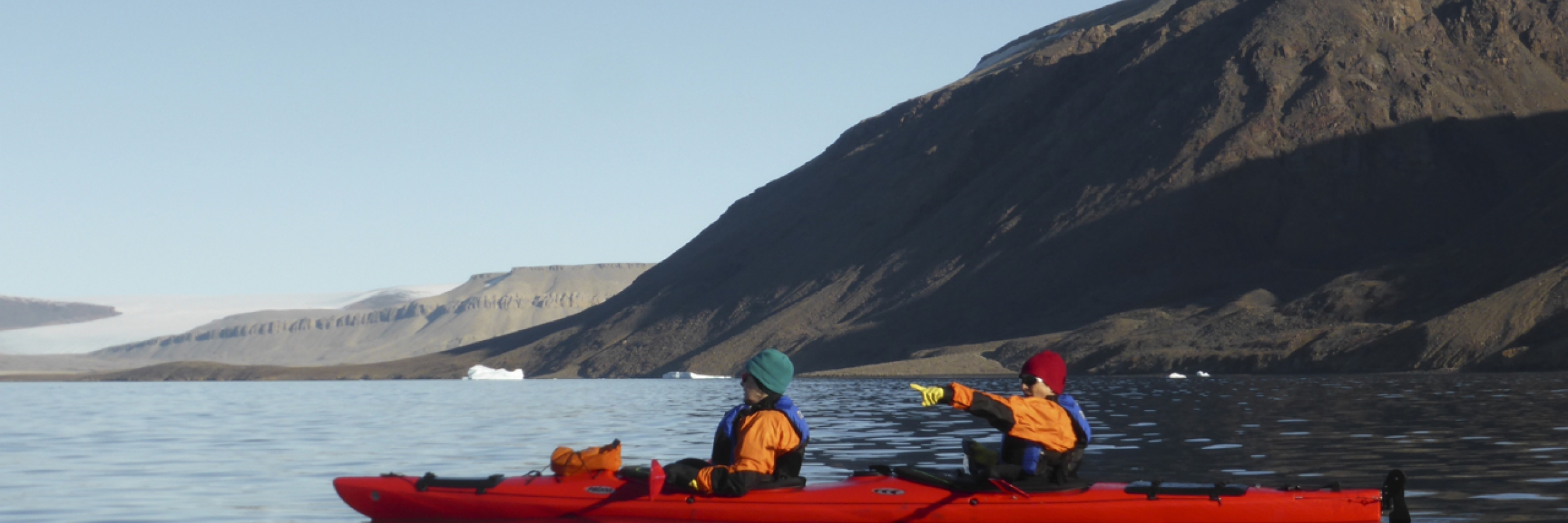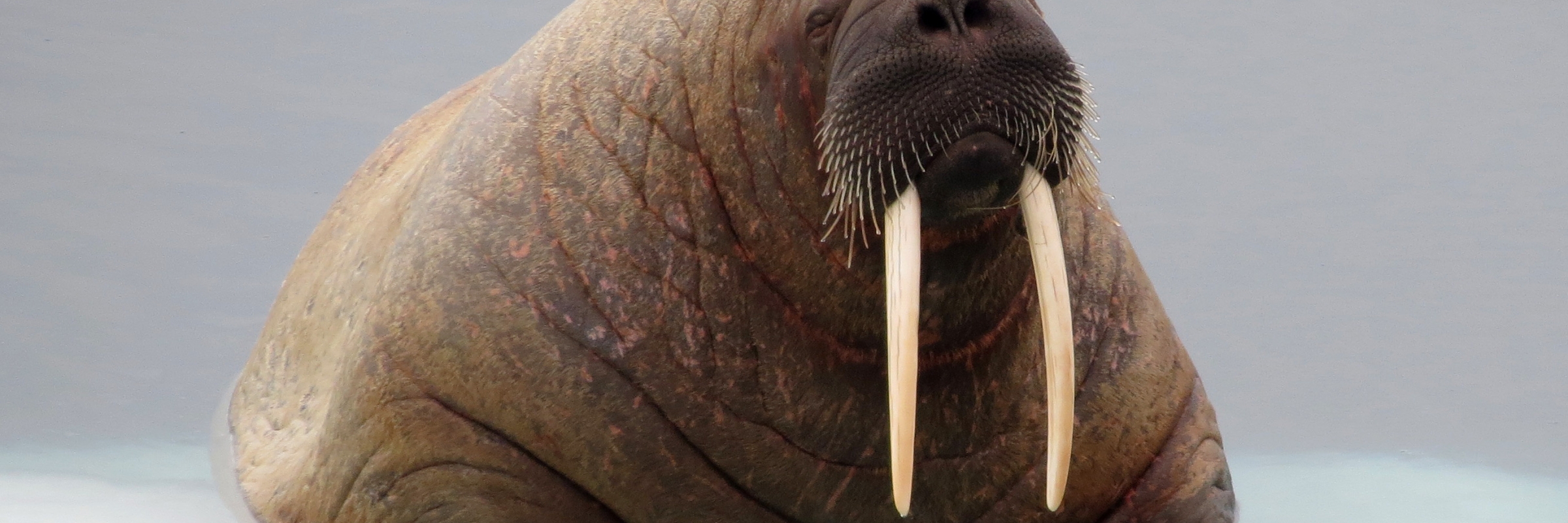Your Arctic expedition begins in Toronto. Explore this vibrant city on your own before spending the night at your well-appointed hotel.
Northwest Passage: Epic High Arctic
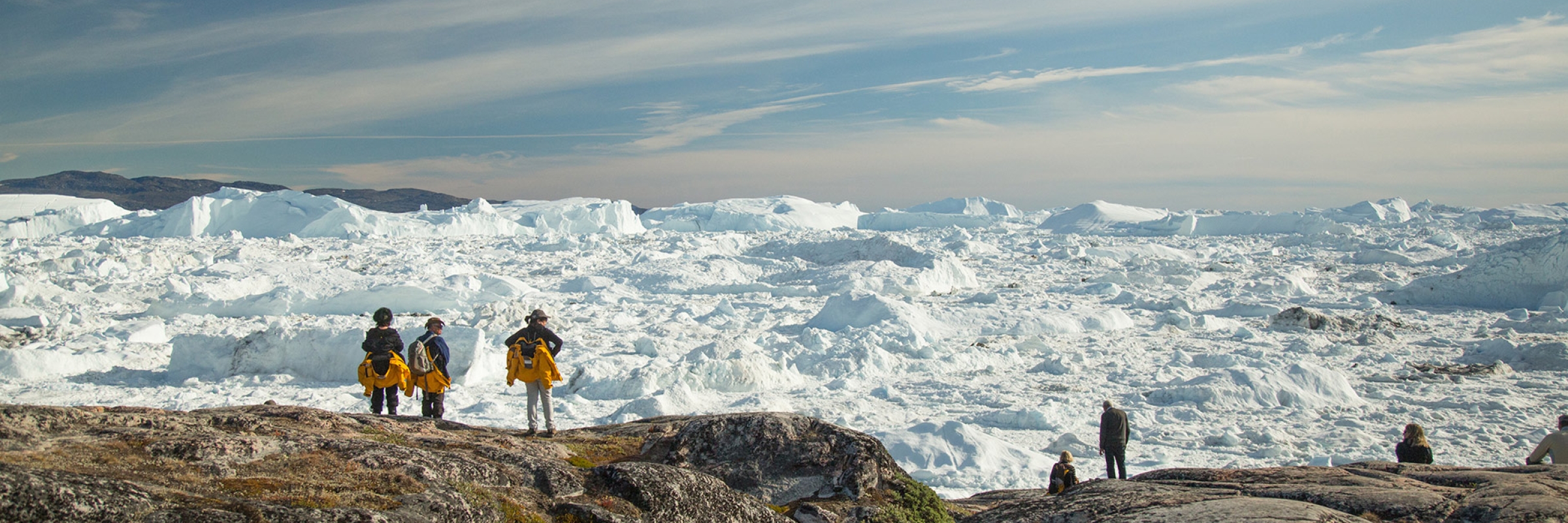
The fabled sea route connecting the Atlantic and Pacific Oceans, the Northwest Passage continues to grip our collective imagination. On this captivating 17-day voyage, we invite you aboard our game-changing new vessel, Ultramarine, to explore this fascinating waterway with an incredible range of on-board comforts and off-ship adventures no other vessel can offer. Passing through the Canadian Arctic archipelago, guests will journey back in time to the height of Arctic exploration, navigating the waters explored by sailors from different lands and visiting the sites that helped unlock the eventual discovery of this long-coveted route.
Aboard the technologically-advanced Ultramarine, you will explore this remarkable environment in unforgettable ways—taking advantage of two twin-engine helicopters, 20 quick-launching Zodiads, the most extensive portfolio of adventure options in the industry, more outdoor wildlife viewing spaces than any other expedition ship its size—to create your quintessential Arctic experience. Marvel at highlights of the Canadian Arctic and Greenland’s stunning west coast, stopping at traditional Inuit and Greenlandic communities. Participate in included helicopter activities and take in the vast, pristine Arctic wilderness from the air. Visit the UNESCO World Heritage site Ilulissat Icefjord, whose Jakobshavn glacier calves off icebergs up to a kilometer high. And keep your eyes peeled for the elusive and majestic creatures who make their home in this harsh, remote landscapes, such as whales, walrus, muskoxen and polar bears. Come aboard Ultramarine, venture to the fabled route that for centuries held explorers in its grip, and return home forever bonded to the spirit of Arctic adventure.
- Experience highlights of the Canadian Arctic and Greenland
- Visit traditional Inuit and Greenlandic communities
- View arctic wildlife, such as whales, walrus and muskoxen
- Explore the Ilulissat Icefjord, a UNESCO World Heritage Site
- Cruise in a Zodiac to get up close to the spectacular scenery
行程
Day 1 — Arrive in Toronto, Canada
Day 2 — Fly to Resolute and Embark
This morning, board your charter flight to Resolute. Upon arrival, you’ll have a chance to walk around this small Arctic town before enjoying your first of many Zodiac cruises as you’re transferred to your ship.
Days 3 to 6 — Exploring Canada’s High Arctic
Cruising around the remote regions of Greenland and the Canadian Arctic aboard Ultramarine, the newest ship in our fleet, you’ll navigate the same icy inlets, channels and bays that fascinated legendary explorers of long ago. Designed to give polar adventurers unprecedented access to the hardest-to-reach places on the planet—and equipped with two onboard twin-engine helicopters for unparalleled access to areas only Quark Expeditions can bring you—this one-of-a-kind ship will take you beyond the familiar in polar exploration. Throughout your journey, your Expedition Team will keep an eye toward immersing you in the best the Arctic has to offer at the top of the world.
Named after explorer Frederick William Beechey, of the Royal Navy, Beechey Island is a Canadian National Historic Site. It’s an important stop on our voyage, as this is the final resting place of three members of Sir John Franklin’s ill-fated 1845–46 expedition to find the Northwest Passage. The graves, on a remote windswept raised beach, were discovered in 1851 by the crew of British and American vessels searching for signs of Franklin’s lost expedition.
Radstock Bay is a popular research location for observing polar bears, which are often seen here in summer. An impressive Thule archaeological site provides insight into how these pre-Inuit people lived in the Far North.
For almost 5,000 years, the hamlet of Arctic Bay and its surrounding area has been occupied by Inuit people who were previously nomads migrating from the west. Surrounded by soaring cliffs teeming with seabirds, this is a great spot to go ashore and learn about the Inuit community’s traditional way of life.
The eastern end of Lancaster Sound affords hiking opportunities on Devon Island. We’ll anchor at Croker Bay, where we’ll cruise near enough to appreciate the splendor of glacial textures and calving ice, while always keeping a safe distance. Walrus frequent the waters here, so be sure to have your camera handy. At Dundas Harbour, trek along
a beach to a former Royal Canadian Mounted Police outpost.
Canada’s most northern settlement, Grise Fiord will be your final shore visit in the Canadian High Arctic. Now home to about 150 residents, the mostly Inuit community was created in 1953, when the federal government forcefully relocated eight Inuit families from northern Quebec. Hunting and fishing are a significant part of their way of life. Visit the monument to the first Inuit settlers, as well as the remnants of the “old camp” where they lived.
Days 7 and 8 — Exploring Smith Sound
Before saying goodbye to Canada, we’ll try to cruise as far north as possible, exploring both sides of Smith Sound, the uninhabited passage between Ellesmere Island and Greenland.
Day 9 — Qaanaaq, Greenland
Your first stop in Greenland is Qaanaaq, formerly known as Thule, one of the northernmost towns in the world. Here, local Inuit share their culture and traditions, and the museum sheds more light on what it’s like living near the top of the world.
Day 10 — At Sea
As we sail south along the west coast of Greenland, presentations by our onboard experts will prepare you for the adventures that lie ahead.
Days 11 to 15 — Exploring West Greenland
With spectacular glaciers, soaring fjords and vibrant communities, the west coast of Greenland will leave you breathless.
Nuussuaq (formerly known as Kraulshavn) is the only mainland community in the Upernavik Archipelago. Founded in 1923 as a trading station, it’s one of the most traditional hunting and fishing villages in Greenland.
Each community visit in Greenland is a unique experience and Uummannaq might just steal your heart. It´s not surprising that the red-hued, heartshaped mountain that rises up behind gave this traditional village its name.
It’s not surprising that the red-hued, heart-shaped mountain that rises up behind Uummannaq gave the traditional community its name (Uummannaq means “heart-like” in Greenlandic). As your ship approaches the shore, you’ll want to be on deck to take in the incredible view of the twin peaks towering over the vibrantly painted wooden houses dotting the rocky terrain below. The settlement was established as a Danish colony in 1758 on the mainland, but it relocated five years later because seal hunting was more plentiful here.
In the nearby archaeological site of Qilaqitsoq (also written as Qilakitsoq), you’ll visit the ruins of an ancient settlement, where the remains of eight fully dressed mummies were discovered under a rock outcrop in 1972 by a pair of hunters. The famous Greenlandic mummies, which date back to 1475 A.D., are on view at the Greenland National Museum in Nuuk.
Cruising farther south rewards with spectacular views of Eqip Sermia. The jagged, blue-tinged glacier soaring out of the icy waters is one of the most beautiful sights in Greenland, and we hope to Zodiac cruise along its massive front from a safe distance. We may also go ashore to explore nearby.
Just south of Ilulissat, which means “iceberg” in Greenlandic, is the impressive Ilulissat Icefjord. The UNESCO World Heritage Site is home to Sermeq Kujalleq, the most productive glacier in the northern hemisphere. As we Zodiac cruise at the mouth of the fjord, you may be lucky to witness the wonders of calving ice (listen to the loud roars as the ice breaks off ). Founded in 1741, the traditional town, which boasts more sled dogs than people, is famous in its own right: it was the birthplace of explorer and anthropologist Knud Rasmussen, the first to traverse the Northwest Passage by dogsled, in the early 1920s . Hikes here lead out to stunning views of the young icebergs as they float out the fjord to Disko Bay.
In Sisimiut, you’ll be treated to a traditional kayaking demonstration. The kayak (an Inuit word that the English borrowed) has become a national symbol of Greenland and has been used by Inuit hunters for thousands of years. The town has several 18th-century colonial buildings, including the oldest surviving church in Greenland, so take time to wander through the historic area.
Surrounded by sea and mountains, Itilleq is situated about a mile (2 km) above the Arctic Circle, in a scenic hollow on a small island. It is the southern limit of the Greenlandic sled dog. To keep the breed pure, the dogs are not permitted south of this community and all other dog breeds are prohibited this far north. It’s also known as a welcoming community, where you might experience “kaffemik,” a Greenlandic tradition of inviting visitors in for coffee, cakes and conversation. Explore the town’s charming wooden houses painted in a rainbow of colors, chat with the locals, whose main trade is fishing, and maybe challenge them to a game of football (soccer) —it won’t be long before you’re experiencing Itilleq’s famous friendly vibe.
Day 16 — Disembark in Kangerlussuaq and Fly to Toronto
Enjoy one more Zodiac ride to shore, where you’ll board your charter flight back to Toronto, Canada. Upon arrival in Toronto, you will be transferred to your included hotel.
Day 17 — Depart Toronto, Canada
Today, you can make your way home at your leisure or spend some time exploring this fascinating city.
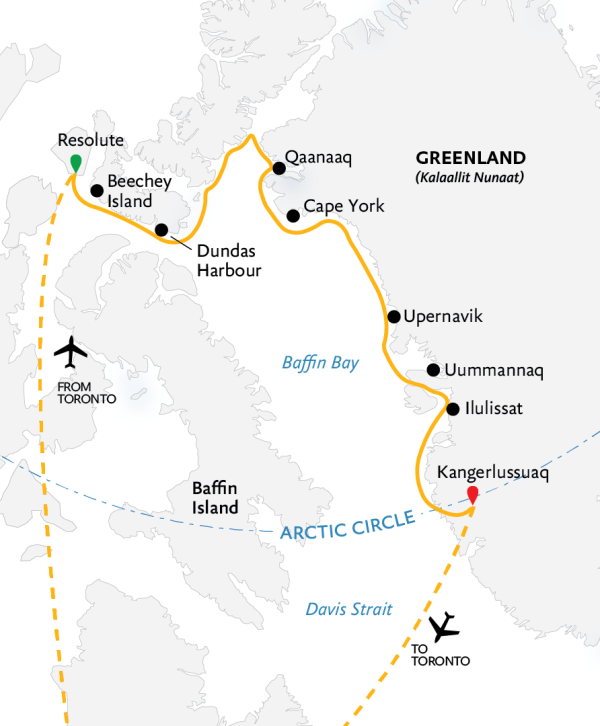
Day 1 — Arrive in Toronto, Canada
Your Arctic expedition begins in Toronto. Explore this vibrant city on your own before spending the night at your well-appointed hotel.
Day 2 — Fly to Resolute and Embark
This morning, board your charter flight to Resolute. Upon arrival, you’ll have a chance to walk around this small Arctic town before enjoying your first of many Zodiac cruises as you’re transferred to your ship.
Days 3 to 6 — Exploring Canada’s High Arctic
Cruising around the remote regions of the Canadian Arctic aboard Ultramarine, the newest ship in our fleet, you’ll navigate the same icy inlets, channels and bays that fascinated legendary explorers of long ago. Designed to give polar adventurers unprecedented access to the hardest-to-reach places on the planet—and equipped with two onboard twin-engine helicopters for unparalleled access to areas only Quark Expeditions can bring you—this one-of-a-kind ship will take you beyond the familiar in polar exploration. Throughout your journey, your Expedition Team will keep an eye toward immersing you in the best the Arctic has to offer at the top of the world.
Named after explorer Frederick William Beechey, of the Royal Navy, Beechey Island is a Canadian National Historic Site. It’s an important stop on our voyage, as this is the final resting place of three members of Sir John Franklin’s ill-fated 1845–46 expedition to find the Northwest Passage. The graves, on a remote windswept raised beach, were discovered in 1851 by the crew of British and American vessels searching for signs of Franklin’s lost expedition.
Radstock Bay is a popular research location for observing polar bears, which are often seen here in summer. An impressive Thule archaeological site provides insight into how these pre-Inuit people lived in the Far North.
For almost 5,000 years, the hamlet of Arctic Bay and its surrounding area has been occupied by Inuit people who were previously nomads migrating from the west. Surrounded by soaring cliffs teeming with seabirds, this is a great spot to go ashore and learn about the Inuit community’s traditional way of life.
The eastern end of Lancaster Sound affords hiking and cruising opportunities on Devon Island. At Dundas Harbour, trek along a beach to a former Royal Canadian Mounted Police outpost. We’ll anchor at Croker Bay, where we’ll cruise near enough to appreciate the splendor of glacial textures and calving ice, while always keeping a safe distance. Walrus frequent the waters here, so be sure to have your camera handy.
Canada’s most northern settlement, Grise Fiord will be your final shore visit in the Canadian High Arctic. Now home to about 150 residents, the mostly Inuit community was created in 1953, when the federal government forcefully relocated eight Inuit families from northern Quebec. Hunting and fishing are a significant part of their way of life. Visit the monument to the first Inuit settlers, as well as the remnants of the “old camp” where they lived.
Days 7 and 8 — Exploring Smith Sound
Before saying goodbye to Canada, we’ll try to cruise as far north as possible, exploring both sides of Smith Sound, the uninhabited passage between Ellesmere Island and Greenland.
Day 9 — Qaanaaq, Greenland
Your first stop in Greenland is Qaanaaq, formerly known as Thule, one of the northernmost towns in the world. Here, local Inuit share their culture and traditions, and the museum sheds more light on what it’s like living near the top of the world.
Day 10 — Cruising
As we sail south along the west coast of Greenland, presentations by our on-board experts will prepare you for the adventures that lie ahead.
Days 11 to 15 — Exploring West Greenland
With spectacular glaciers, soaring fjords and vibrant communities, the west coast of Greenland will leave you breathless.
Nuussuaq (formerly known as Kraulshavn) is the only mainland community in the Upernavik Archipelago. Founded in 1923 as a trading station, it’s one of the most traditional hunting and fishing villages in Greenland.
Each community visit in Greenland is a unique experience and Uummannaq might just steal your heart. It’s not surprising that the red-hued, heart-shaped mountain that rises up behind gave this traditional village its name (Uummannaq means “heart-like” in Greenlandic). As your ship approaches the shore, you’ll want to be on deck to take in the incredible view of the twin peaks towering over the vibrantly painted wooden houses dotting the rocky terrain below. The settlement was established as a Danish colony in 1758 on the mainland, but it relocated five years later because seal hunting was more plentiful here.
In the nearby archaeological site of Qilaqitsoq (also written as Qilakitsoq), you’ll visit the ruins of an ancient settlement, where the remains of eight fully dressed mummies were discovered under a rock outcrop in 1972 by a pair of hunters. The famous Greenlandic mummies, which date back to 1475 A.D., are on view at the Greenland National Museum in Nuuk.
Cruising farther south rewards with spectacular views of Eqip Sermia. The jagged, blue-tinged glacier soaring out of the icy waters is one of the most beautiful sights in Greenland, and we hope to Zodiac cruise along its massive front from a safe distance. We may also go ashore to explore nearby.
Just south of Ilulissat, which means “iceberg” in Greenlandic, is the impressive Ilulissat Icefjord. The UNESCO World Heritage Site is home to Sermeq Kujalleq, the most productive glacier in the northern hemisphere. As we Zodiac cruise at the mouth of the fjord, you may be lucky to witness the wonders of calving ice (listen to the loud roars as the ice breaks off). Founded in 1741, the traditional town, which boasts more sled dogs than people, is famous in its own right: it was the birthplace of explorer and anthropologist Knud Rasmussen, the first to traverse the Northwest Passage by dogsled, in the early 1920s . Hikes here lead out to stunning views of the young icebergs as they float out the fjord to Disko Bay.
In Sisimiut, you’ll be treated to a traditional kayaking demonstration. The kayak (an Inuit word that the English borrowed) has become a national symbol of Greenland and has been used by Inuit hunters for thousands of years. The town has several 18th-century colonial buildings, including the oldest surviving church in Greenland, so take time to wander through the historic area.
Surrounded by sea and mountains, Itilleq is situated about a mile (2 km) above the Arctic Circle, in a scenic hollow on a small island. It is the southern limit of the Greenlandic sled dog. To keep the breed pure, the dogs are not permitted south of this community and all other dog breeds are prohibited this far north. It’s also known as a welcoming community, where you might experience “kaffemik,” a Greenlandic tradition of inviting visitors in for coffee, cakes and conversation. Explore the town’s charming wooden houses painted in a rainbow of colors, chat with the locals, whose main trade is fishing, and maybe challenge them to a game of football (soccer) —it won’t be long before you’re experiencing Itilleq’s famous friendly vibe.
Day 16 — Disembark in Kangerlussuaq and Fly to Toronto
Enjoy one more Zodiac ride to shore, where you’ll board your charter flight back to Toronto, Canada. Upon arrival in Toronto, you will be transferred to your included hotel.
Day 17 — Depart Toronto, Canada
Today, you can make your way home at your leisure or spend some time exploring this fascinating city.

